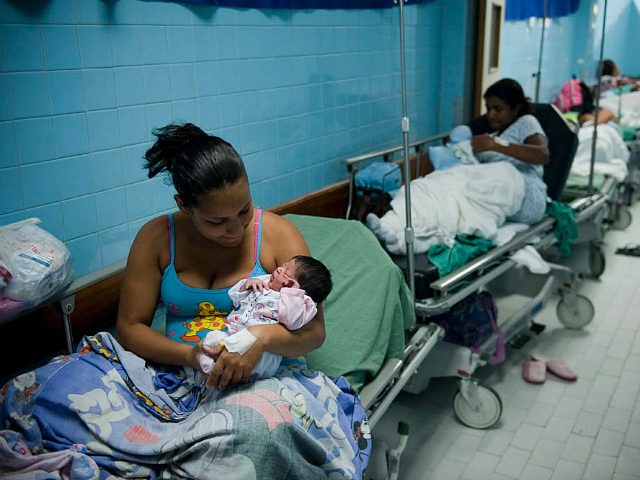Venezuela released public health statistics for the first time in nearly two years this week, revealing skyrocketing infant and maternal mortality rates and a boom in the spread of diseases like malaria. Diphtheria, a disease Venezuela had fully eradicated by the 1990s, has returned.
Venezuela’s Ministry of Health published the document on their website. The Venezuelan news site La Patilla posted the fact sheet featuring these statistics in its totality online.
Boletín Epidemiológico, el Ministerio del Poder Popular para la Salud by La Patilla on Scribd
The sheet begins highlighting rotovirus, encouraging parents to vaccinate their children, and Legionnaire’s Disease, blaming Europe, Australia, and the United States for an alleged increase in the number of cases.
The tables cataloging incidents of health problems show that infant mortality and maternal mortality – defined as the death of a pregnant woman or mother within 42 days of giving birth – are a much bigger problem in the country. The report notes that 11,466 children under the age of one died in Venezuela in 2016, a 32.1 percent increase from the infant mortality rate in 2015. Maternal mortality rose 65 percent in that year to 756 deaths, up from 456 in 2015.
Cases of malaria increased by 76 percent, and diptheria returned to Venezuela. Cases of disease like Zika and Chikungunya were also pervasive nationwide.
The rise in deaths of children and mothers indicates not just a failure to contain disease but also belies the significant shortages of necessary tools and medicines in hospitals. The Venezuelan Pharmaceutical Federation (Fefarven) announced in March that the nation was facing a shortage of 85 percent of the basic medications the World Health Organization (WHO) considers necessary to maintain a functioning health care system, a wide variety of drugs that includes everything from antibiotics to chemotherapy medication to birth control. Studies estimate that over 80 percent of the nation’s government-owned medical imaging technology no longer functions because there is no way to repair it.
Just as citizens are lacking access to laundry detergent and disinfectant, so too have Venezuela’s hospitals, meaning patients are routinely exposed to infection. In a notorious incident two years ago, an opossum infestation triggered by lack of cleaning products killed 17 infants in a maternity ward in Anzoátegui.
Maternity wards have been especially hard-hit given the lack of birth control pills and other contraceptives in the country, which has triggered a rise in unwanted pregnancy rates. Many Venezuelan women have also resorted to clandestine sterilization procedures to avoid getting pregnant, which exposes them to a new variety of health risk factors.
Infections are particularly common due to lack of cleaning products and particularly difficult to control due to a lack of antibiotics. Doctors thus resort to amputations to keep patients from dying.
In many instances, doctors say they are unable to treat patients at all. “Patients die in our arms because there is nothing to treat them with,” Vanesa Carmona, a Venezuelan medical student, told reporters. “We are not going to school to become accomplices to genocide.”
Doctors and medical students form a significant block within the anti-socialist opposition. Carmona’s cohort in Anzoátegui revealed that medical students are learning “wartime practices” to keep patients alive, such as using clothing instead of gauze or cotton balls and closing wounds with limited stitches available.
A coalition of doctor’s in the nation’s capital announced scheduled protests against the government this week, demanding international aid to prevent deaths in their hospitals. The head of the nation’s internal medicine society, Maritza Duran, told reporters that public health indicators had collapsed “dramatically,” with doctors barely able to address basic illnesses.
The shortages began in 2014, following the nationalization of a variety of national corporations under dictator Nicolás Maduro, which reduced the domestic production of medicine to nearly nothing. Venezuela now relies on charity from the communist government of Cuba, whose drugs are of low quality and patients protest often trigger unpredictable painful side effects.
Maduro called for a United Nations project to help Venezuela’s health care system in March after denying that the nation had medical shortages worth international attention.

COMMENTS
Please let us know if you're having issues with commenting.